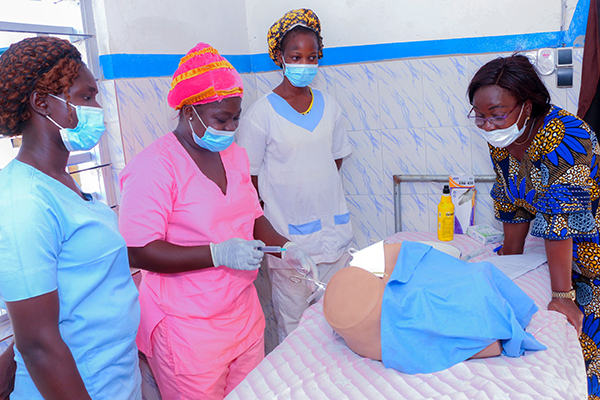Improving Quality of Care in Private Health Facilities in Benin
August 1, 2022

The private sector in Benin plays a key role in the country’s health system, providing around 60% of care to the population back in 2019. However, recent governmental reforms have resulted in the closure of many private health facilities (PHFs), causing a decline in the private sector’s contribution to health care services.
Despite its significant contribution, the private health sector is marked by a low quality of services and care, contributing to the persistence of maternal and neonatal morbidity and mortality. The quality of health care services in the private sector remains a challenge due to the absence of a quality improvement program. That’s where the USAID’S Private Sector Health Partnership Activity (PSHPA) in conjunction with the Ministry of Health (MoH) comes in to improve the quality of care found in private health facilities.
The PSHPA project aims to increase the use of high-impact reproductive, maternal, newborn, and child health (RMNCH) services provided by the private sector by organizing 10-day service delivery trainings on Benin’s High Impact Interventions Package (PIHI, in French) topics that are meant to improve survivals of mothers and their babies. As a result, the proportion of registered PHFs with accredited RMNCH services has increased across the country. Specifically, 344 PHF providers in 10 departments of Benin have received in-person PIHI from August 2019 to March 2022.
To ensure that the trained providers maintain their skills, an on-the-job post-training follow-up is organized in the various health facilities. This includes working with certified MoH supervisors to assess the skills and practices of each trained provider using a checklist, and using weaknesses to conduct on-site refresher training. At the same time, providers who were unable to attend the initial in-person training are trained on the job. A total of 987 providers were trained on the job, resulting in improved management of obstetric and neonatal emergencies and a significant reduction in maternal and neonatal mortality in PHFs.
The organization of this follow-up and the briefing of untrained providers on-site has been highly appreciated by PHF providers and supervisors themselves through expression of their satisfaction. Testimonies given by each of them show that this is a first in the history of PHFs in Benin and has been essential in providing more people access to quality RMNCH services.
"Let me congratulate PSHPA and USAID for all that they are doing for the development and acquisition of skills at the PHF level; this was a great need for PHFs because it was missing in these structures. There is the training but we were not aware of the high impact intervention package at all. The selected PHFs were very happy to participate in this follow-up and there was a real desire to improve their skills. I think this follow-up will improve maternal and child survival. My hope is that this will be a permanent activity. This follow-up should not be left to the state because the acquisition of competence is only acquired with regular practice. The organization of the activity is also very good, and it is good that they go to the PHFs with the equipment for practice, which allows the providers to continue acquiring skills," said Dr. Houansou Josiane, pediatrician, member of a follow-up team in Porto-Novo.